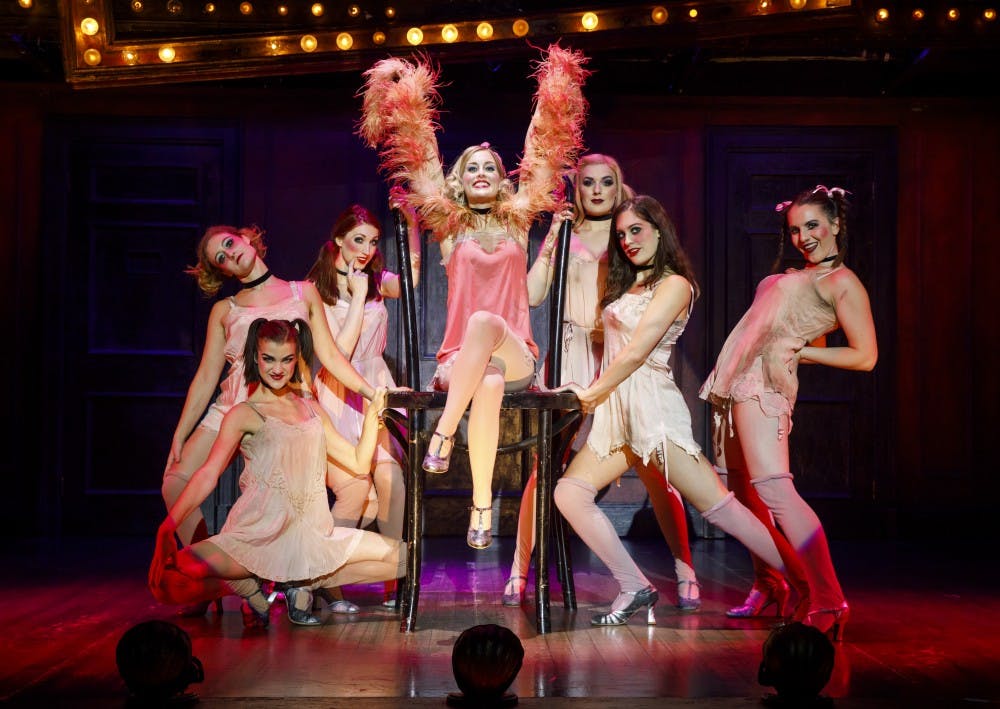After a dance performance by provocatively dressed performers in the musical “Cabaret,” the Emcee, played by Erik Schneider, addressed the crowd.
“Don’t forget to tip the girls, though they can take much more than just the tip!” he sang, followed by his cackling.
IU Auditorium presented the musical “Cabaret” on March 21 and 22.
The show opened with the Emcee singing “Willkommen.”
“Life is disappointing, huh?” the Emcee sang. “Forget it! In here, life is beautiful.”
“Cabaret” follows the story of Clifford Bradshaw, an American writer in pre-World War II Berlin, Germany. Along the way, he befriended German citizens and fell in love with Sally Bowles, who danced at the cabaret.
Interspersed in the story were cabaret performances in the seedy Kit Kat Klub.
The performances were filled with sexual tension. Dancers would crawl, grab, thrust, bend and stroke against each other and the Emcee as they sing about money, love and affairs.
The cabaret sequences were rambunctious and liberating, with songs such as “Money.”
The Emcee swung around a briefcase of money as female dancers crawled and reached for it.
During the song “Two Ladies,” the Emcee and two dancers sang about their abundant threesomes. At one point, they disappeared behind a screen and projected silhouettes onto it. They then thrusted and engaged in outrageous, wild sexual positions.
At intermission, the Emcee came down into the audience and danced with them. He pulled a tall, blonde man from the front row to his feet.
“You look like you have a little German in you,” the Emcee said to the audience member. “Would you like a little more German in you?”
“Cabaret” offered more than flashy entertainment. At a party, Cliff’s friend, Ernst Ludwig, decided to dance. He handed Cliff his hat and his jacket. Underneath was a bright red Nazi armband.
Ludwig criticized Herr Schultz for being Jewish and not being a German. The other dancers suddenly formed rows in narrow slits of light and shadow, heiling with their right hands and stomping with a marching sound.
“But he was born here,” Fräulein Schneider said.
“He. Is not. A German,” Ludwig said.
Woven into the entertainment was a subtle awareness of the treachery, horrors and prejudice of Nazi Germany. Instead of confronting reality, the characters drowned it in the flashy lights and entertainment of the cabaret.
In the song, “If You Could See Her,” the Emcee expressed his love for a gorilla, wearing a pink dress and cap. The two danced around, caressing and holding one another in an affectionate manner.
“When we’re walking together, they sneer if I’m holding her hand,” the Emcee sang. “But if they could see her through my eyes, maybe they’d all understand.”
The final line of the song delivered commentary on the German perception of Jewish people as ugly and undesirable.
“If you could see her through my eyes, she wouldn’t look Jewish at all,” the Emcee sang.
Another song, “Tomorrow Belongs to Me,” begins with a single German woman's voice. Other voices joined in. Soon, the whole chorus bellowed the lyrics. The song instilled the listeners with images of Nazi pride, optimism and a sense of dawning glory.
“The morning will come when the world is mine,” they sang. “Tomorrow belongs to me!”
All the while, the Emcee stood above the stage, smoking a cigarette and watching with a stoic smolder.
As the Nazi imagery became more prominent, the scenes in the Kit Kat Klub devolved into a manic and hectic crashing of sound and implications. Sally sang, but without the flashy dancing, clothes or lights of the other performances. The musical accompaniment bellowed through, as if there were no real world problems confronting the characters or Germany at large.
By the end of her performance, she was screaming her lyrics and threw her microphone stand to the ground, hair disheveled.
After they lost their ability to resist, the characters dawned on new realizations about their lives in Germany. Toward the end of the musical, Cliff reflected on his time in Berlin.
“There was a Cabaret,” Cliff said. “And there was a master of ceremonies, and there was a city called Berlin in a country called Germany. It was the end of the world. And I was dancing with Sally Bowles, and we were both fast asleep.”




